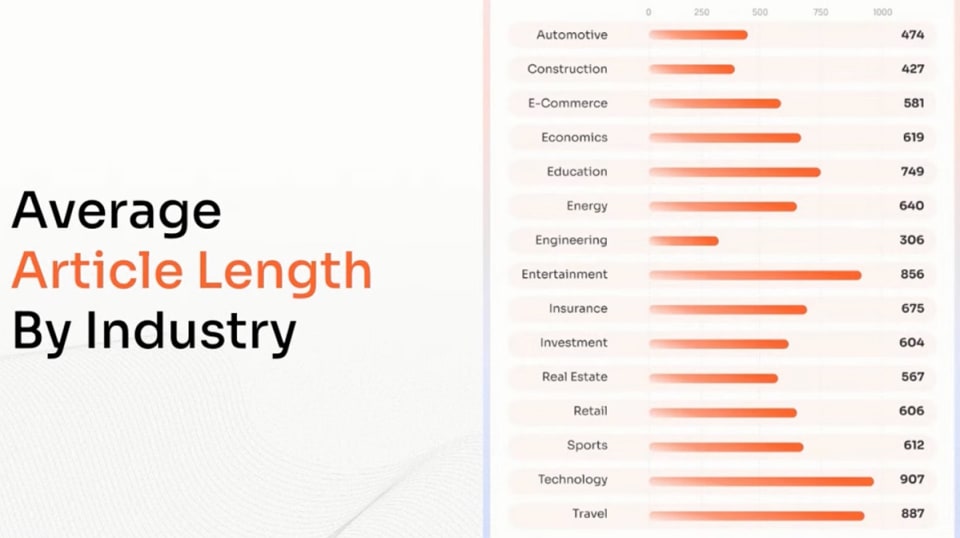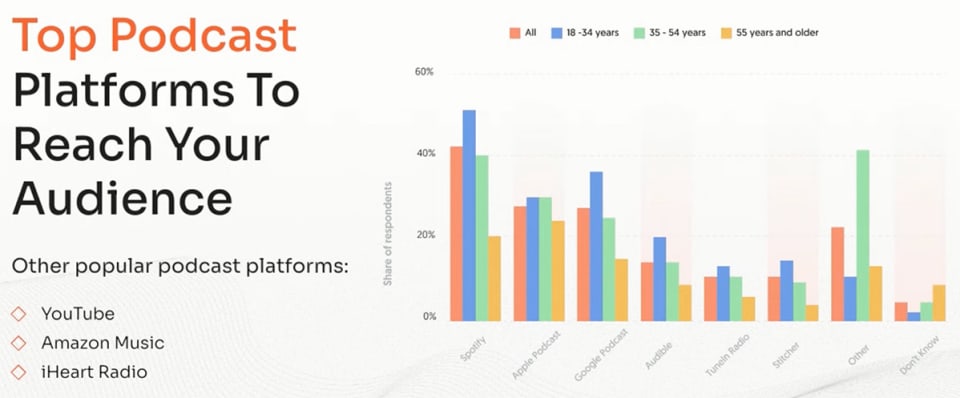Battle Royale: Blogs Vs. Podcasts

Are you ready for the ultimate showdown between blogs and podcasts? Because we’re ready to get to the bottom of it. This debate’s recently been taking the content marketing world by storm, and we’re here to break it down for you.
Blogs and podcasts alike are great methods for improving Search Engine Optimization, engaging audiences, and gaining trust and authority in the digital world. However, they vary drastically in terms of production, broadcast mediums and expertise required for execution.
To understand which type of content will perform better for your business's marketing needs, there are certain factors to consider: return on investment, time, budget, skillset, audience demand and equipment needed.
So, to blog or to podcast? That is the question.
To ensure we’ve dotted all our i’s and crossed all our t’s, let’s analyze both forms of content individually and head-to-head.
Starting with blogs, for businesses both big and small, they’re the easiest way to create content that’s optimized, engaging, and has the power to drive traffic to your website, eventually leading to conversions. Why? Because they’re affordable and scalable, blogs only require the bare minimum in terms of resources and are one of the best—tried & tested—sources for SEO.
Blogging Pros
- Boost SEO efforts
Regular, well-targeted blogs can do wonders for your search engine rankings. However, it’s best not to ‘wing it’ because having a plan will strategically help you target missing keywords or ones not performing too well on landing pages and organically result in increased natural internal link building and high-quality backlinks. - Low barriers to entry
All you need (if you don’t already have a website) is a domain name and a platform to host your site (either paid or free), and voila! You can start planning your strategy for publishing valuable content. Writing is also way easier (and less expensive) than video and audio production needed for podcast & YouTube publishing. - Build brand authority
Successful blogs usually answer consumers’ frequently asked questions, and when your audience finds value, they’re more likely to take action. The one thing that separates brands with established authority from their lesser counterparts is their content strategy. Pro tip: Your content must serve your target audience for you to earn authority. Be sure to be consistent so that your content is deemed reliable, and before you know it, you’ll be the go-to in your niche of product/ service offerings.

Keep your word count in check and readers hooked! Source: Neil Patel Digital - Statista, 2023
Blogging Cons
- Commitment is a must (no take-backsies!)
Nothing good comes easy, and that extends to blogs, too; just showing up by writing, posting content and hoping to captivate your audience won’t cut it. Your content must be planned out in advance and backed by strategy, mainly because the rules of SEO are continuously evolving; if you want to stay relevant, commitment is vital.
- Saturated market
There are over 600 million published blogs, which is one blog for every 13 people on the planet and by the time you’re done reading this blog post, there’ll be a whopping 23,000 blogs that have gone live. Woah. Saying that the industry is saturated is an understatement. But that’s not to say it’s losing strength as a method of creating content. All you need is careful planning and trying different approaches to keep up with the competition. - Less effective for SEO compared to the past
The saturated blog universe means it’s harder to stand out on Google, so you won’t see the positive effect on your Google rankings as quickly as 5 or 10 years ago. Establishing your online presence and building an audience takes time, so you’ll have to be patient and consistent before noticing significant returns on investment.
Moving on to podcasts, they serve as audio content marketing, offering tangible marketing benefits for business growth. Though it’s not a direct revenue driver, starting a business podcast is a strategic approach to enhancing website traffic, establishing brand authority, and strengthening audience connections.
The crux? Identifying your target listeners and addressing their real problems will result in a podcast that gains traction, contributing to overall business success.
Podcasting Pros
- Build connections & relationships
Like calls to like, so when an audience hears a host speaking about their business or industry; their natural inclination is to bond, connect and react. It’s at the core of human nature. Gone are the days of faceless brands; consumers sort through digital clutter by buying into ‘people’ as opposed to products. From an organic lead's perspective, conversion rates are higher when your audience feels like they know and trust you. - Less competition, low saturation
Though podcasts have exploded in popularity, they’re definitely the new kids on the block. But with thousands of active podcasts and over 30 million podcast episodes already available, is there space for your brand? Yes! For some context, based on this post, blogging has existed as a digital marketing technique for almost 30 years with over 600M active blogs, compared to podcasting, which has been around for nearly 16 years and roughly 30M podcasts to show for it. Some basic number crunching tells us that for every 20 published blogs, there’s only 1 published podcast.
TL, DR: There’s tons of scope for your brand to grow within podcasting as a marketing channel. - Convenience & accessibility
Every 4 in 5 Canadians own a smartphone, so naturally, podcasts have become extremely easy to access and consume, either while driving or on the go. Unlike reading articles, you don't need to use your eyes—you can listen to audio wherever you are. So, presenting your brand, service, or story on a podcast is better understood and much easier to engage with than written content. Some top platforms to reach your audience are Spotify, Apple and Google podcasts, especially if your audience is between 18 and 34.

Amplify your message by reaching your audience where they’re listening. Source: Neil Patel Digital - Statista, 2023
Podcasting Cons
- Technical challenges
Attempting to get comfortable with recording and editing podcasts can seem overwhelming, with a learning curve that is anything but straightforward. Companies operating on a smaller scale and budget may find themselves questioning the ROI and usually end up either outsourcing the task or hiring professionals. We’ve also settled the dilemma of outsourcing vs. hiring a marketing team; check out our previous post to learn more!
Pro tip - if you jack your mics into your camera (like we do for Twin Creek’s shows), you now have a video AND an audio podcast! Same work but double the output. - Tracking gets tricky
Tracking your podcast analytics can be tricky, especially for user engagement, conversions, and other vital metrics. That means determining whether your podcast is successful or not can get complicated. Unlike mediums like Facebook and YouTube, where likes, shares and views can indicate popularity or trackable metric sources—there's no single way to track the exact number of people who listen to your podcast, even if it’s downloaded.
However, there is a silver lining, metrics like podcast downloads and subscriptions allow podcasters to ‘guess’-timate the size of their audience. - Higher investment
While creating podcasts, quality and production time are like oil and water. The aim is to produce high-quality content consistently, but the output will suffer if you are pressed for time, budget, or tech skills. Take a course, watch some how-to videos on YouTube, or ask for help.
- $0 - if you’re solo, you can record a “voice memo” with your iPhone or Android. That’s about as affordable as it gets!
- $1000 - usually, you’ll need a microphone (or two for interviews), a laptop, and software to record your podcast.
- $5000 to $10,000 - the next level is getting some studio equipment. Since we have an office, we dedicated 1 room for our “Zoom Room,” which is set up for Zoom meetings most of the time but doubles as a studio on days we drop a camera in front of the desk. We have a big softbox light off to the side to light our faces, a digital camera in front of us, with professional mics running into an I/O box, then out into the mic input on the camera.
Sticking to a regular podcast release schedule has to be a priority when you start a podcast. Audiences anticipate a regular publishing schedule. However, producing an engaging podcast requires time, as it needs multiple cycles of planning, production, and editing.
Speaking of, check out our latest podcast episode from Between Two Creeks, and witness the magic of our ‘Zoom Room’ doubling as our podcast studio!
Blog vs. Podcast: Which wins the battle?
Drumroll, please
.
.
.
Neither! We do both, but there’s no one-size-fits-all answer. When it comes to choosing between the success rates of blogs and podcasts, it all depends on the business. Some businesses benefit more from a blog rather than a podcast, or vice versa. Ultimately, deciding what works best for your business, goals, and audience is up to you.
In addition, evaluate your budget and capabilities. While blogging is cost-efficient (especially when your website is available), podcasting demands equipment, audio/video software, and tech-savvy skills.
The Golden Takeaways
- Put. Your. Audience. First.
Drawing blanks on how to structure your content? Think about your audience. Consider their needs and what problems you can solve for them. What questions are they asking? Can you proactively address them? Do they prefer reading or listening? Then, you can determine whether it would fit better as an informative article or a podcast. - Humans >>> AI
Since we’re all about helpful nuggets of information, Let’s talk about AI for a sec. Unsurprisingly, AI has created big waves in content generation because of its rapid progression. But, it turns out that in terms of performance on Search Engine Results Pages (SERP), human-written content beats AI-generated content 94.12% of the time!

Genuineness and authenticity trumps machine-learning! Source: Neil Patel Digital - Statista, 2023
- Assess your team
Skills matter when creating a vlog/podcast and a regular text blog. Make notes of who is available and capable of taking on either channel. Has someone been pitching topic ideas? Maybe they have some experience writing and would like to take on the task of becoming a blogger?
Is there someone with a working knowledge of the podcast process who listens to other industry-focused shows and, therefore, knows what works and what doesn't? Deciding on a blog or podcast strategy involves several moving pieces; being calculative of the skills at your disposal will help guide you toward the path of success. - Always know your competition’s moves
Are your competitors blogging? Podcasting? Or even both? Before you start scrambling to create content, assess what other similar brands are doing and whether they're doing it well. Who within your industry is ranking high in Google searches? What kind of content are they producing?
You need to know what's out there to avoid stale topics and holes in your strategy. To quote the legendary Jim Halpert: “It’s always better to be pre-pre-pre-prepared.” You can then start creating well-researched, fresh content.
Battle scars—aka mistakes and fails—are inevitable while you figure out what works best for your business, but in the meantime, reach out to us at Twin Creek Media; we’re more than happy to be your extended marketing agency and crack the code for your business’ success. Whether it’s blogs, podcasts, or more, we’ve got the expertise to support you!
Twin Creek Media is Kelowna’s marketing department, available to help you build your brand, pump up your social media channels, or refresh your website. Meet the rest of your Marketing Dream Team and contact us today to discuss the growth of your company!

